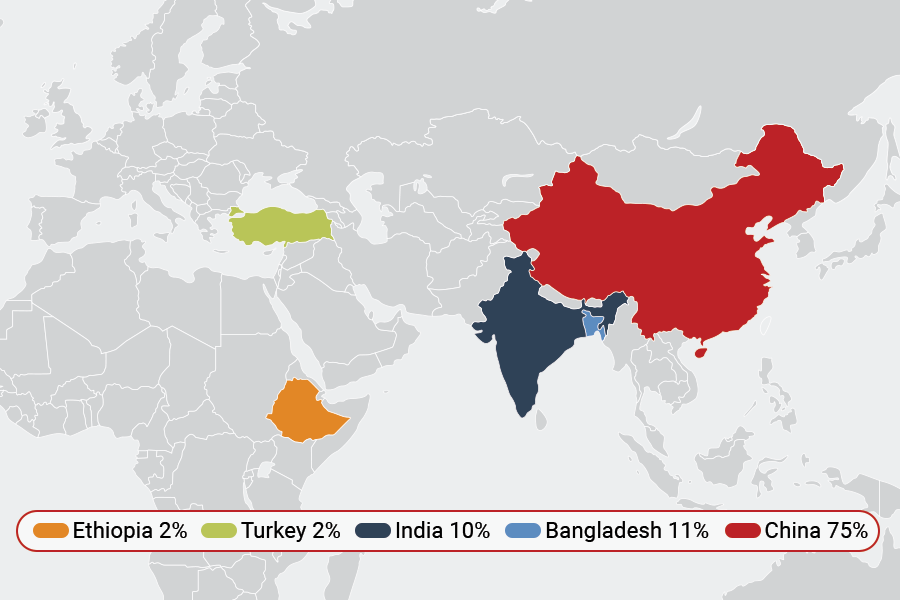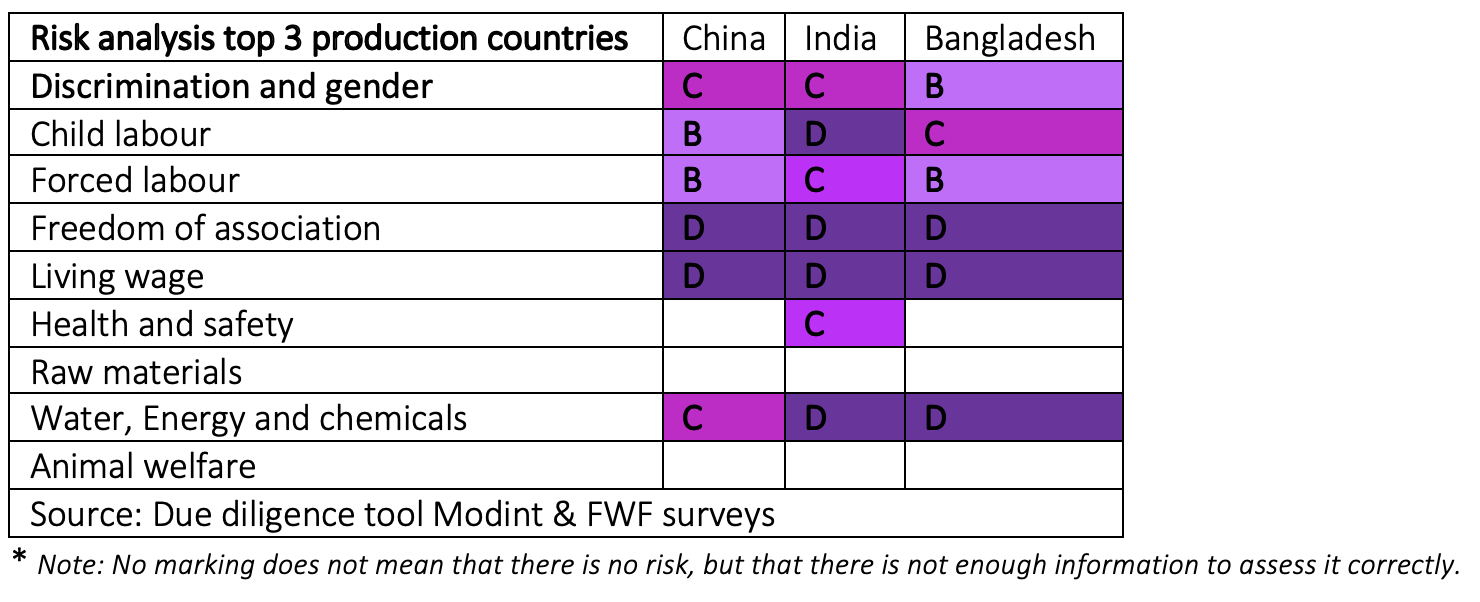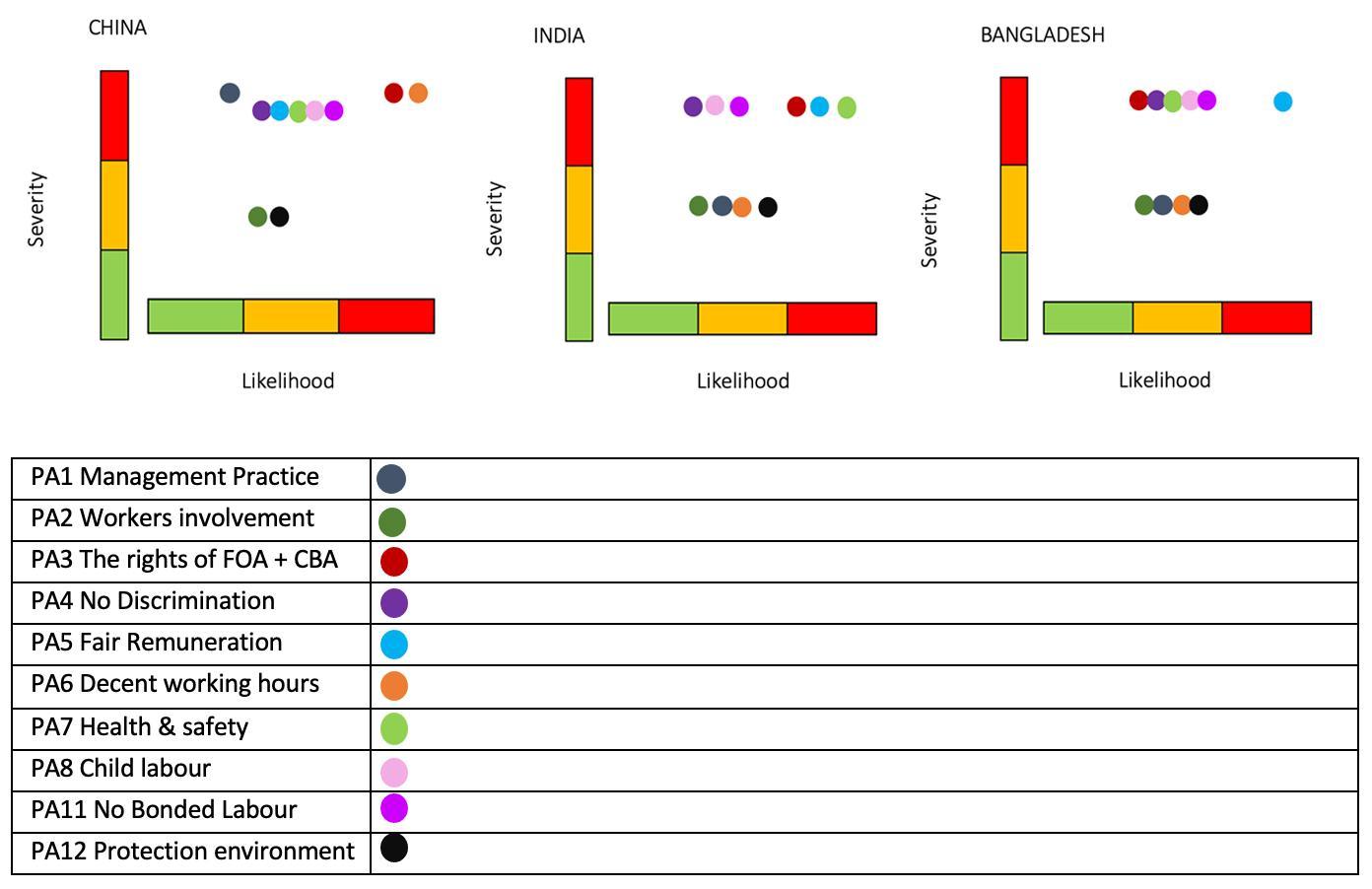

Sustainability & due diligence
Due diligence
Our commitment to supply chain transparency during COVID-19
Our due diligence
Erve Group has internal processes to make sure sustainability and due diligence are incorporated in daily operations throughout the supply chain. We select new suppliers in consultation with various departments: purchasing, sales and quality. Our CSR managers based in production countries conduct the Erve Group ‘facility check’ to verify that suppliers are compliant with the Erve Group Code of Conduct. Suppliers must also provide proof of their social compliance and quality status (BSCI, SA8000, SMETA, and Oekotex). All of our products are produced in audited factories. Without a valid audit, a facility cannot produce for Erve Group.
Working together for safer practices
Erve Group sources from high-risk countries and is aware that there might be potential risks in the supply chain. Beconnected offices seek out and monitor these risks on the ground. We report to our Erve Group through facility checklists and daily quality checks.
When potential risks are identified, we ask suppliers to analyze them and provide us with a corrective action plan. Together with the supplier, Erve Group conducts further investigations and, if necessary, prevents or mitigates any adverse impact of that risk. We support our suppliers in meeting the required labor standards and provide training on them when required. We endeavor to incorporate the assessment of possible risks in purchasing behavior and practices, treating our suppliers with respect and consideration during our cooperation.
Erve Group implements the guiding principles of the UN on business and human rights. As a member of Amfori BSCI, it is mandatory to install an effective grievances mechanism in all our production facilities. The effectiveness of these mechanisms is checked during audits. Grievance mechanisms are also part of the auditing process of Accord. Any complaints that are reported will be handled by the factory, Amfori/Accord and the brands. Erve Group also has its own ‘support channel’ for communicating workplace information. All agents and business partners of Erve Group are obligated to notify and address non-conformities and breaches of human rights.
Erve Group is in constant communication with Amfori, Centexbel, Accord, customers, licensors and third-party institutes. We also recently became a member of Modint for practical help with our due diligence.
Locations where our products are made

Risk management
As a signatory of the Dutch Agreement for Garments and Textile, Erve Group conducts due diligence. We identify risks in our supply chain and work to minimize actual and potential impacts. When negative impacts on people and the planet are identified, we work in close cooperation with the supplier to take action. When analyzing risks, we also assess materials, processes and purchasing practices. We have set priorities based on severity and likelihood. The likelihood of risks is determined by the actual likelihood of their occurrence. Likely risks include, for example, health and safety in times of Covid, the vast amount of water used during cotton production, payment of a living wage and the lack of freedom of association in China and India.
Risk analysis Erve Group
Production for Beconnected/Erve Group takes place in China (75%), Bangladesh (11%), India (10%), Turkey (2%) and Ethiopia (2%). We have examined each country individually to understand the risks to people and the environment. A risk analysis has been conducted based on nine themes as set by the Dutch Agreement. The risks are indicated with a letter, similar to BSCI ratings, where A is very low risk and E is very high risk.

Risks based on production locations
We have conducted an audit analysis to see what is happening in our own supply chain. 100% of our clothing and textiles is produced by CMT suppliers who have had an independent social audit: BSCI, SA8000, SMETA or ILS. Of the independently assessed suppliers, 43% of our knitting, dyeing, finishing, printing and raw material processing suppliers are audited.
Severity and likelihood
The below matrixes show the most serious and most probable risks in our chain per country. This is a combination of country risks and risks that have emerged from the social audit reports. We have verified our conclusions with stakeholders and adjusted them where necessary. The analysis has been assessed by stakeholders such as CNV, FNV, Arisa, Solidaridad and Modint.

China: Management Practice, freedom of association, decent working hours
India: Freedom of association, fair remuneration, health and safety
Bangladesh: Freedom of association, discrimination, fair remuneration
The other countries we are producing in have been analyzed as well and the results checked with stakeholders, but these will not be addressed this year since these are not the most serious and likely risks.
Freedom of association
Since freedom of association has been detected as a risk in India, China and Bangladesh, we are participating in the collective project Amplify, which is coordinated by CNV and FNV. We have selected one strategic supplier each in India and China. In India, we have already gained better insights in how freedom of association is organized in the factory by conducting interviews with supplier management and workers. We will start holding interviews in China as well, and as we approach the next year, we will analyze which steps need to be taken to further implement and improve freedom of association in these factories. We will apply our learnings and insights at other suppliers in China, India and Bangladesh.
Living wage
A living wage is a wage that is sufficient to meet the basic needs of a family of average size in the country where that family lives. We have inventoried the differences between the legal minimum wages, the wages paid and the living wage at our CMT suppliers, which cover at least 80% of our purchasing value. Through this analysis, we’ve learned that all these suppliers pay at least the mandatory legal minimum wages as implemented by various governments. But we must conclude that in all our production countries, there remains a significant gap between this legal minimum and the applicable living wages in the specific countries. We have learned that implementing a living wage is a complex and lengthy process that requires input from local governments and other stakeholders. Towards the end of this year, we want to further analyze this topic by updating and improving the implemented complaints mechanism. Based on the learnings of Amplify, we want to further promote freedom of association among the workers in the factories. In addition, we will take first steps to see if we can make small changes in our internal buying process, which might have an effect on this gap.
Health and safety
Based on last year’s analysis, we learned that health and safety were difficult to analyze, especially during the coronavirus pandemic. We started gathering more insights through the basic health and safety checks by Fair Wair and the checklist for covid-related health-and-safety measures for our strategic CMT suppliers. We will continue implementing this as the topic will remain an important one, even once the pandemic has hopefully subsided.
Raw materials
We assessed the raw materials we use through the materials list of the Agreement on Sustainable Garment and Textiles (AGT). The majority – 79% – of Erve’s production is cotton. This is primarily conventional cotton, followed by some production under the Better Cotton Initiative (BCI) and organic cotton under the Global Organic Textile Standard (GOTS). Erve Group is dedicated to increasing our use of sustainable cotton. We encourage our customers to buy more responsibly, as we rely on the demand of the end consumer to realize this goal.
The environmental impact of conventional cotton production is highly dependent on growing practices and local conditions. In general, a lot of water and pesticides or fertilizers are used during production and cultivation of the crop.16% of insecticide used globally is used in the cotton industry. Almost 1 kg of hazardous pesticides are used for every hectare of cotton planted, so conventional cotton has a huge chemical impact. The working conditions of the farmers might be a concern in these countries, since the chemicals might be applied in unsafe circumstances, which can affect the health of the workers. Lastly, fabric processing, for example dyeing, requires a lot of energy. It goes without saying that Erve Group is doing everything in its power to change all aspects of the process for the better. We are very careful in selecting the right suppliers and partners. For example, we only use non-hazardous chemicals. This is verified by he MRSL and ZDHC. For the use and treatment of water, we will require all our wet processing suppliers to become DETOX-certified.
Water, energy and chemicals (WeCH)
A lot of water, energy and chemicals are used in the production of clothing. This occurs mainly as part of processes such as dyeing, printing, washing and finishing materials. We want to investigate how we can reduce the use of water, chemicals and energy in the production process of cotton and its finishing. We will do this based on the production of more sustainable materials, which partly covers the possible risks of using large amounts of water and energy and of generating pollution.
Our products are made with respect for people and the planet
we careBeconnected is part of Erve Group
Our products are made with respect for people and the planet. If you want to know more about our efforts to improve our supply chain, please send an email.
Erve Group
Beconnected is a part of Erve Group, which began in 1985 in Brussels, the capital of Europe.
Quality & Compliance
If there’s anything we take more seriously than fashion, it’s quality, safety, the environment and corporate social responsibility.
Company values
Beconnected’s company values
are represented as animated characters with a whole lot of personality.